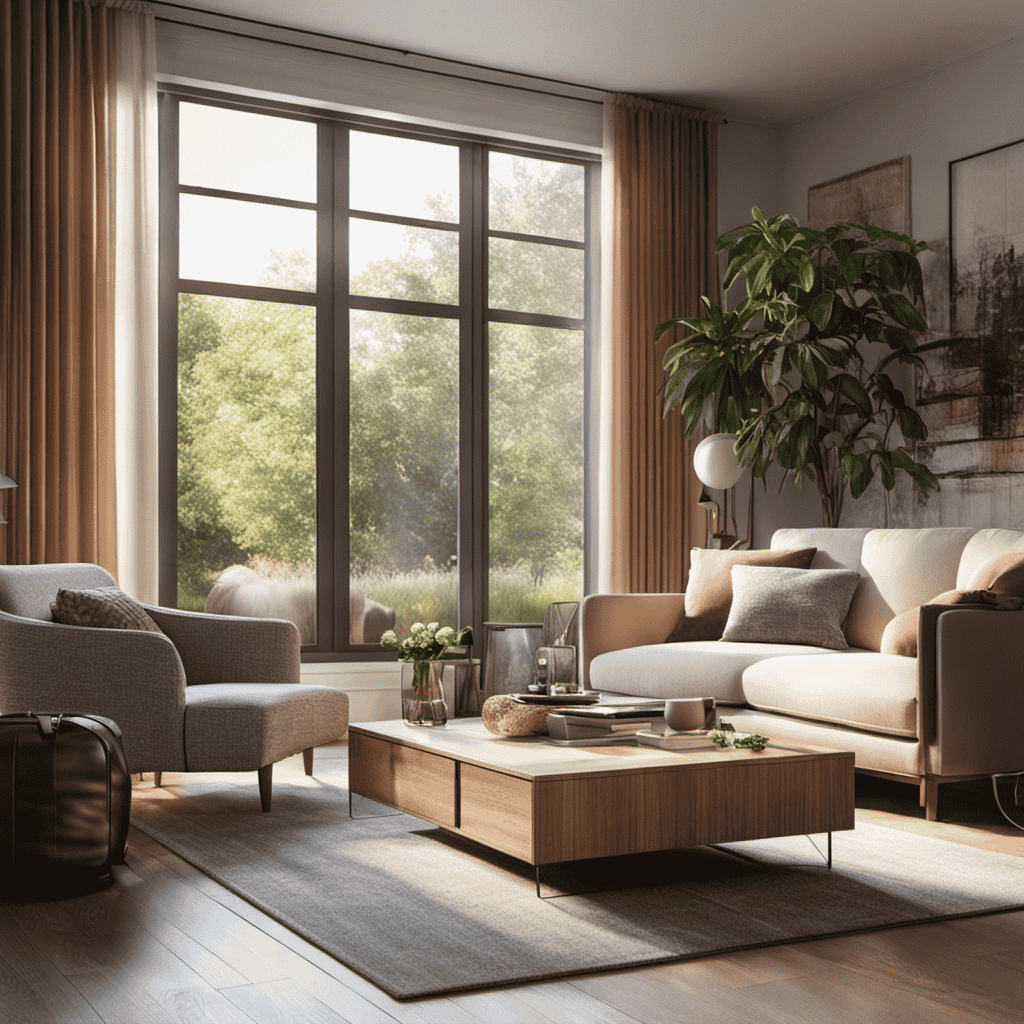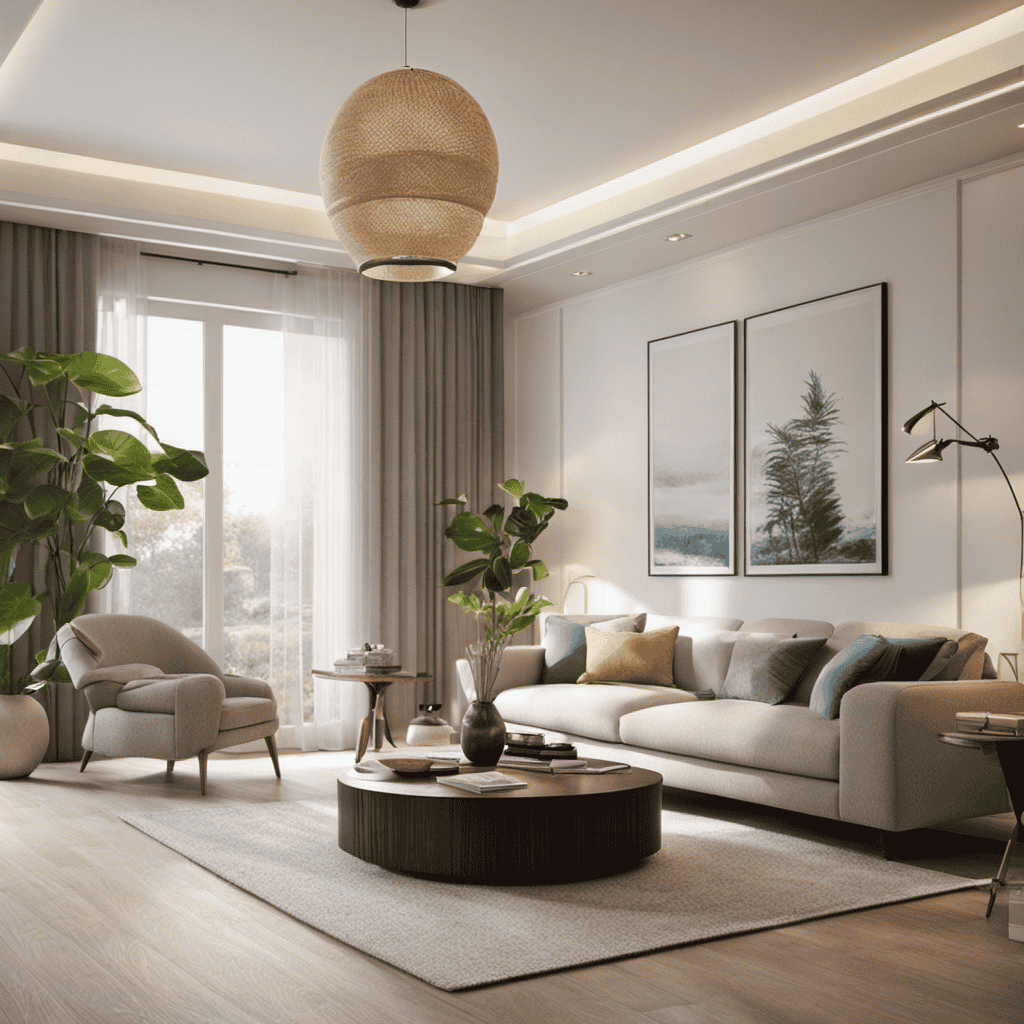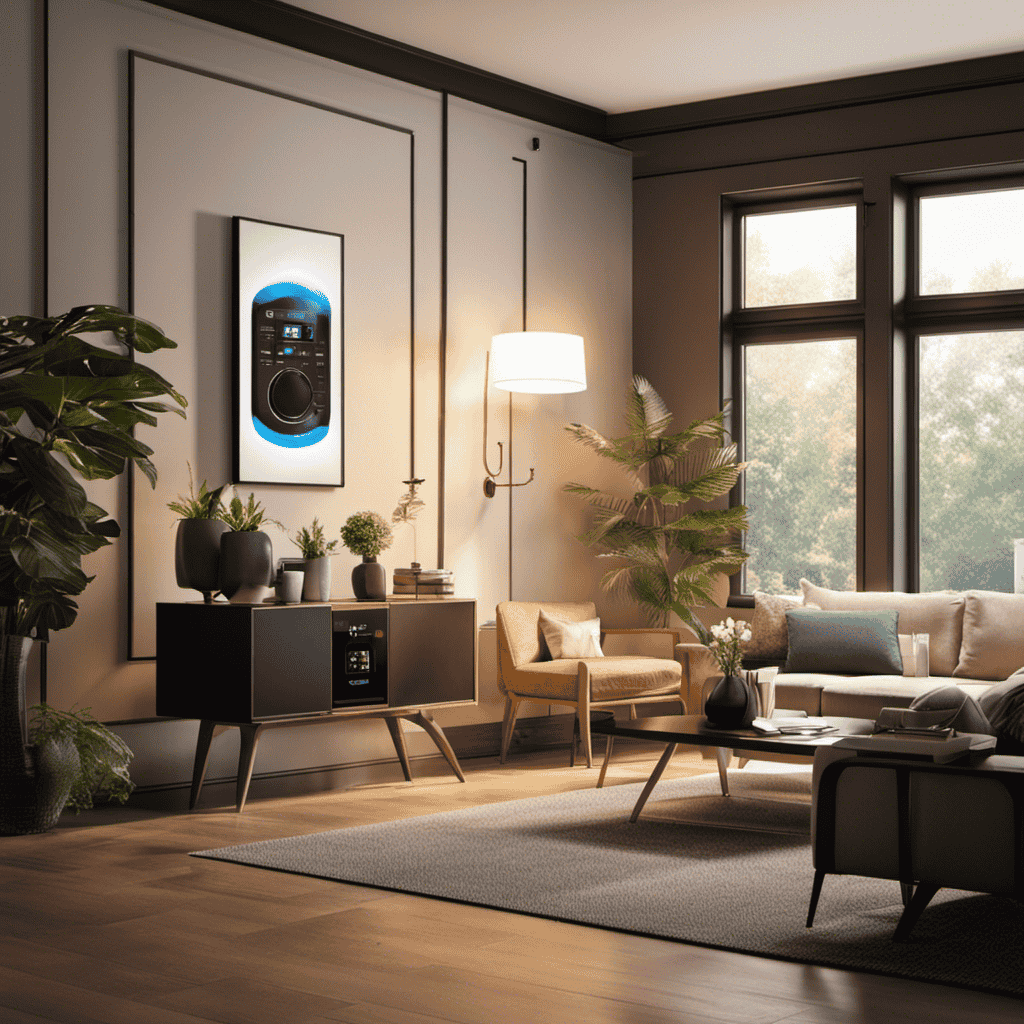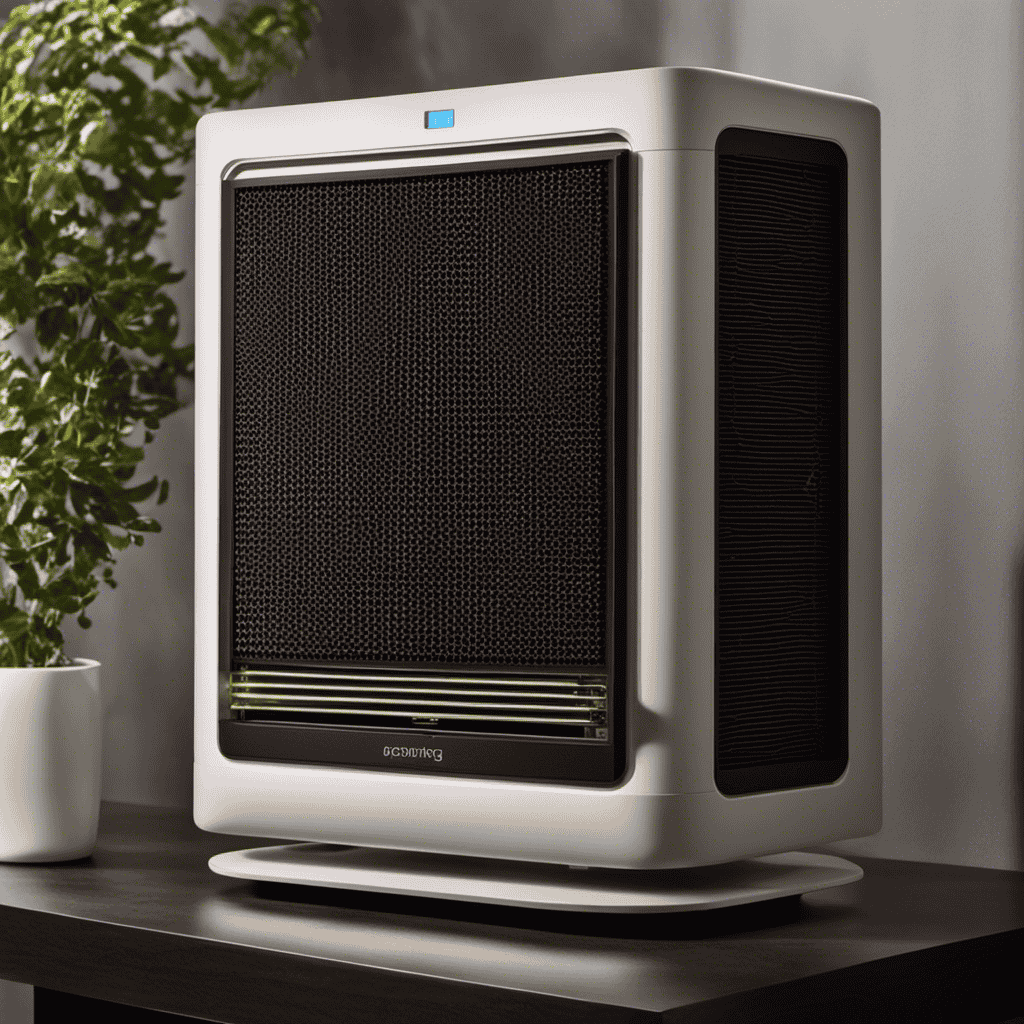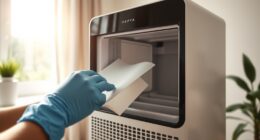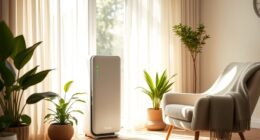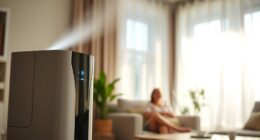I’ve always been mindful of the air quality in my home, particularly with allergies and respiratory problems. Therefore, once I discovered the advantages of air purifiers, I made it a priority to use mine efficiently.
But it got me thinking, how often should I really be running it? In this article, we’ll dive into the science behind air purifiers and explore the recommended frequency for optimal results.
So, let’s clear the air and find out how often you should run an air purifier.
Key Takeaways
- Running an air purifier for at least 8 hours a day effectively removes airborne pollutants such as dust, pet dander, pollen, and mold spores.
- Regular usage of an air purifier filters out harmful particles, improving indoor air quality and reducing the risk of respiratory diseases.
- Room size, air pollution level, and sensitivity to contaminants should be considered when determining the optimal duration for running an air purifier.
- Adjust the duration of air purifier operation based on seasonal conditions, such as running it for longer durations in colder seasons to maintain optimal humidity levels.
Benefits of Running an Air Purifier Regularly
If you want to improve the air quality in your home, running an air purifier regularly can provide significant benefits. The duration of air purifier usage plays a crucial role in maintaining clean air and ensuring optimal health benefits.
Research has shown that running an air purifier for at least 8 hours a day can effectively remove airborne pollutants such as dust, pet dander, pollen, and mold spores. These pollutants can trigger allergies and asthma symptoms, leading to respiratory issues and decreased overall well-being.
By continuously running an air purifier, you can create an environment with cleaner air, reducing the risk of respiratory infections and improving sleep quality.
Clean air is vital for our health. Breathing in polluted air can have detrimental effects on our respiratory system and overall health. Regular usage of an air purifier filters out harmful particles, improving indoor air quality and reducing the risk of respiratory diseases.
Clean air promotes better lung function, reduces the frequency of allergies and asthma attacks, and enhances overall respiratory health. Additionally, cleaner air can have positive effects on our mental well-being, improving concentration and productivity.
Factors to Consider When Determining Air Purifier Usage
To determine how frequently to use an air purifier, take into account various factors. Factors such as the size of the room, the level of air pollution, the presence of allergens or odors, and the sensitivity of individuals in the space should all be considered. By evaluating these factors, you can determine the optimal usage pattern for your air purifier, ensuring that it effectively cleans the air while minimizing energy consumption.
Consider the following table which outlines the factors to consider and the benefits of regular usage:
| Factors to Consider | Benefits of Regular Usage |
|---|---|
| Room size | Removes pollutants |
| Air pollution level | Reduces allergens |
| Presence of odors | Eliminates odors |
| Sensitivity | Improves respiratory health |
By taking these factors into account, you can determine the ideal frequency of air purifier usage. For example, if you have a large room with high levels of air pollution and individuals with respiratory sensitivities, it may be beneficial to run the air purifier continuously. However, in a smaller room with low pollution levels, running the air purifier on a lower setting for a few hours a day may suffice.
Considering these factors will help you find the right balance between maintaining clean air and energy efficiency. In the next section, we will discuss the recommended duration for running an air purifier.
Recommended Duration for Running an Air Purifier
Consider the factors discussed to determine the optimal duration for running your air purifier. The recommended running time for air purifiers in closed spaces depends on various factors affecting air purifier usage. Here are some key considerations:
-
Room size: Larger rooms may require longer running times to ensure effective air purification. Smaller rooms may need less time.
-
Air quality: If you live in an area with high levels of pollution or allergens, running the air purifier for longer periods can help maintain clean air.
-
Sensitivity to contaminants: Individuals with respiratory conditions or allergies may benefit from running the air purifier for extended periods to reduce exposure to airborne particles.
In addition to these factors, it is essential to consider the manufacturer’s recommendations for your specific air purifier model. They may provide guidelines on the recommended duration for optimal performance.
Transitioning to the next section about ‘how often should you run an air purifier in different seasons,’ it is important to note that the running time may vary depending on the season and environmental conditions.
How Often Should You Run an Air Purifier in Different Seasons
When running an air purifier in different seasons, it’s important to adjust the duration based on the specific environmental conditions. The ideal air purifier settings may vary depending on factors such as temperature, humidity, and outdoor air quality.
In colder seasons, such as winter, indoor air tends to be drier due to heating systems. Dry air can aggravate respiratory conditions and cause discomfort. Running the air purifier for longer durations can help maintain optimal humidity levels and reduce the risk of dryness-induced health issues.
On the other hand, during hot and humid seasons, such as summer, the air purifier may need to be run for shorter durations to prevent excess moisture buildup, which can promote the growth of mold and mildew.
By adjusting the duration of air purifier operation based on seasonal conditions, you can maximize the benefits of using air purifiers in different environments. This ensures that you breathe cleaner air and enjoy improved indoor air quality throughout the year.
Now that we understand the importance of adjusting air purifier duration based on seasonal conditions, let’s explore the signs that indicate it’s time to run your air purifier.
Signs That Indicate It’s Time to Run Your Air Purifier
As an air quality expert, I’ve come across two key points that indicate the need to run an air purifier:
-
Lingering odors or smells could be a sign of poor indoor air quality caused by pollutants such as cooking fumes, pet dander, or cigarette smoke.
-
In addition, increased allergy symptoms, such as sneezing, coughing, or watery eyes, can be a result of airborne allergens like pollen, dust mites, or mold spores.
Lingering Odors or Smells
If you have lingering odors or smells in your home, you might want to consider running your air purifier more frequently. Air purifiers are designed to remove contaminants from the air, including pet odors and cooking smells. By running your air purifier consistently, you can effectively eliminate these odors and improve the overall air quality in your home.
Here are two key benefits of running your air purifier more often:
-
Eliminating pet odors:
-
Air purifiers use filters to capture pet dander and hair, which are often the main sources of unpleasant pet odors.
-
Activated carbon filters in air purifiers can effectively absorb and neutralize the odor molecules, leaving your home smelling fresh and clean.
-
Reducing cooking smells:
-
Air purifiers can help remove cooking smells by filtering out the volatile organic compounds (VOCs) released during the cooking process.
-
High-efficiency particulate air (HEPA) filters in air purifiers can trap tiny particles and odorous substances, ensuring that cooking smells are effectively captured and eliminated.
Increased Allergy Symptoms?
Running your air purifier more frequently can help alleviate increased allergy symptoms.
Allergens such as pollen, dust mites, and pet dander can trigger allergic reactions in sensitive individuals, leading to symptoms like sneezing, itching, and congestion.
By continuously operating the air purifier, more airborne allergens can be captured and removed from the indoor environment, reducing the overall allergen load. This can have a positive impact on respiratory health, especially for those with asthma or other respiratory conditions.
Studies have shown that air purifiers can effectively reduce airborne allergens and improve symptoms in allergy sufferers. To maximize the benefits, it’s recommended to run the air purifier continuously or for longer periods of time, particularly during allergy seasons or in areas with high allergen levels.
Tips for Maximizing the Efficiency of Your Air Purifier
When it comes to maximizing the efficiency of your air purifier, two key factors to consider are filter replacement frequency and ideal placement for effectiveness.
The frequency at which you should replace the filters in your air purifier depends on various factors, such as the manufacturer’s recommendations, the level of pollutants in your environment, and the type of filters used. It is important to follow the manufacturer’s guidelines to ensure that your air purifier continues to function optimally.
Additionally, the ideal placement of your air purifier can greatly impact its effectiveness. Placing it in a central location, away from walls and furniture, and ensuring that it has proper airflow can help it capture and remove pollutants more efficiently.
Filter Replacement Frequency
The filter in an air purifier should typically be replaced every three to six months, depending on usage. Regular filter replacement is essential to maintain the effectiveness of the air purifier and ensure clean air in your home. Here are some key points regarding filter replacement schedule and the importance of clean air in the home:
-
Filter Replacement Schedule:
-
Replace the filter every three months for optimal performance.
-
If you have pets or live in a highly polluted area, consider replacing the filter every three months.
-
Importance of Clean Air in the Home:
-
Clean air reduces the risk of respiratory illnesses and allergies.
-
It removes pollutants, such as dust, pollen, pet dander, and mold spores from the air, improving overall air quality.
Regularly replacing the filter in your air purifier is crucial to maintain clean air in your home. But how does the placement of the air purifier affect its effectiveness?
Ideal Placement for Effectiveness?
Placing an air purifier in the right location can greatly enhance its effectiveness. Proper placement considerations include the size of the room, proximity to pollution sources, and airflow patterns. To maximize the purifier’s efficiency, it is important to avoid blocking the air intake or exhaust vents. Here is a table summarizing the key placement considerations:
| Consideration | Importance |
|---|---|
| Room size | Ensure purifier is suitable for room dimensions |
| Pollution sources | Place near potential sources like kitchen or pet areas |
| Airflow patterns | Position to optimize air circulation |
In addition to proper placement, proper maintenance is crucial for optimal performance. Regularly cleaning or replacing filters, as recommended by the manufacturer, ensures that the purifier continues to effectively remove pollutants from the air. Neglecting maintenance can diminish its effectiveness and increase energy consumption.
Now that we understand the importance of placement and maintenance, let’s delve into how to choose the right air purifier for your needs.
How to Choose the Right Air Purifier for Your Needs
To choose the right air purifier for your needs, it’s important to consider factors such as room size, filtration technology, and noise level. When it comes to choosing the right air purifier, there are a few key factors to keep in mind:
-
Room size: The size of the room you plan to use the air purifier in will determine the appropriate size and power of the purifier. It’s important to choose a purifier that is capable of effectively purifying the air in your specific room size.
-
Filtration technology: Different air purifiers use different filtration technologies, such as HEPA filters, activated carbon filters, or electrostatic precipitators. It’s important to understand the specific needs of your indoor environment and choose a purifier that utilizes the appropriate filtration technology.
Maximizing air purifier efficiency is crucial for optimal air quality. To achieve this, consider the following factors:
-
Noise level: Some air purifiers can be quite loud, which can be disruptive if you plan to use them in bedrooms or other quiet areas. Look for models that have a noise level that is acceptable for your needs.
-
Energy consumption: Air purifiers can use a significant amount of energy, so it’s important to choose a model that is energy efficient. Look for purifiers with the ENERGY STAR label, as these have been certified to meet strict energy efficiency guidelines.
By carefully considering these factors, you can choose the right air purifier for your needs and maximize its efficiency in purifying the air in your indoor environment.
Transitioning into the subsequent section about common mistakes to avoid when operating an air purifier, it’s important to understand how to properly maintain and use your purifier to ensure its effectiveness.
Common Mistakes to Avoid When Operating an Air Purifier
One common mistake people make when operating an air purifier is forgetting to regularly clean or replace the filters. Filters are essential components of an air purifier, as they trap and remove airborne particles, allergens, and pollutants from the air. Over time, these filters can become clogged with dirt, dust, and other debris, reducing their effectiveness and potentially causing the air purifier to malfunction.
To avoid this mistake, it is important to follow the manufacturer’s instructions regarding filter maintenance. Most air purifiers have replaceable filters that need to be changed every 6 to 12 months, depending on usage and the level of air pollution in your environment. Additionally, some filters are washable and can be cleaned regularly to remove accumulated dirt. It is crucial to inspect the filters regularly and clean or replace them as necessary to ensure optimal performance of the air purifier.
Another common mistake is placing the air purifier in the wrong location. To achieve maximum efficiency, the air purifier should be placed in a central location within the room, away from walls and furniture. Placing it near obstacles can obstruct the airflow and hinder its ability to clean the air effectively. Additionally, it is important to keep the air purifier away from heat sources, such as radiators or direct sunlight, as this can affect its performance.
Is There a Standard Frequency for Using an Air Purifier?
The recommended using air purifier frequency depends on factors like room size and air quality. Typically, experts suggest running the air purifier continuously for optimal results. However, in smaller spaces or low-pollution areas, using it for a few hours daily can suffice.
Frequently Asked Questions
Can Running an Air Purifier Too Often Be Harmful to My Health?
Running an air purifier continuously may have potential side effects on health. The continuous operation of an air purifier can lead to excessive dryness in the air, which can cause discomfort, especially for those with respiratory issues.
Additionally, running an air purifier constantly can also increase energy consumption and result in higher electricity bills. It is important to strike a balance and use the air purifier when necessary, such as during periods of high pollution or when there are specific allergens present in the air.
Are There Any Specific Types of Air Purifiers That Are More Effective in Certain Seasons?
When it comes to the effectiveness of air purifiers in different seasons, certain types do show benefits.
For example, in pollen-heavy seasons, purifiers with HEPA filters can effectively remove allergens from the air.
In humid climates, purifiers with dehumidification capabilities can help control mold and mildew growth.
Additionally, purifiers with activated carbon filters can be particularly useful in reducing odors and volatile organic compounds in any season.
Understanding the specific needs of your climate can help you choose the most effective air purifier.
Should I Keep My Windows Open While Running an Air Purifier?
When running an air purifier, it’s recommended to keep your windows closed. This helps to prevent outdoor pollutants, such as pollen and dust, from entering your home and defeating the purpose of the air purifier.
Can an Air Purifier Eliminate All Types of Indoor Air Pollutants?
When it comes to air purifier maintenance, understanding its capabilities is crucial. While an air purifier can effectively remove various indoor air pollutants, it may not eliminate all types completely. Factors like the type of pollutant, room size, and the purifier’s efficiency play a role.
However, using an air purifier consistently can provide numerous benefits, like reducing allergens and improving air quality. Regularly cleaning and replacing filters will ensure optimal performance and maximum pollutant removal.
Is It Necessary to Run an Air Purifier in a Room Where I Spend Most of My Time, Such as a Bedroom or Home Office?
In my experience, running an air purifier in a room where I spend most of my time, like a bedroom or home office, has proven to be necessary.
Not only does it help maintain clean and fresh air, but it also reduces the presence of allergens, dust, and other pollutants.
Regularly running an air purifier ensures that the air quality is continuously improved, promoting a healthier living environment.
To maximize its effectiveness, it’s essential to follow air purifier maintenance tips for optimal performance.
Conclusion
In conclusion, running an air purifier regularly is crucial for maintaining clean and healthy indoor air. By considering factors such as room size, air quality, and personal preferences, you can determine the appropriate duration for running your air purifier.
While some may argue that running an air purifier constantly may be unnecessary, it’s important to note that pollutants can accumulate quickly, especially in high-traffic areas or during certain seasons.
By investing in a high-quality air purifier and following the recommended guidelines, you can effectively improve the air quality in your home and ensure a healthier living environment.
